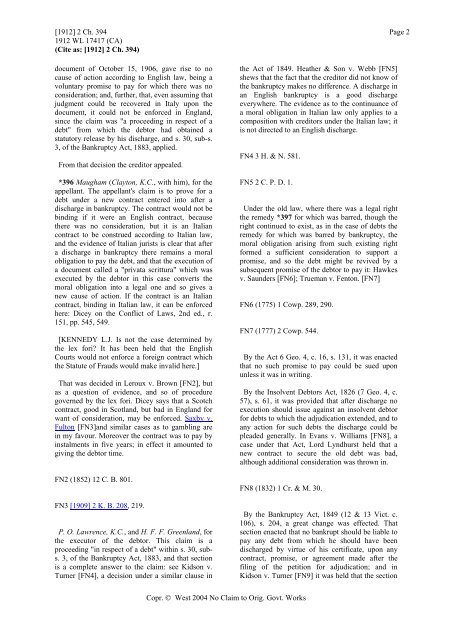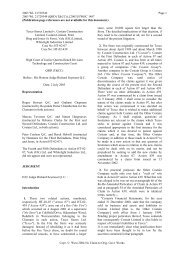In Re Bonacina Le Brasseur v Bonacina - Thomson Reuters
In Re Bonacina Le Brasseur v Bonacina - Thomson Reuters
In Re Bonacina Le Brasseur v Bonacina - Thomson Reuters
Create successful ePaper yourself
Turn your PDF publications into a flip-book with our unique Google optimized e-Paper software.
[1912] 2 Ch. 394 Page 21912 WL 17417 (CA)(Cite as: [1912] 2 Ch. 394)document of October 15, 1906, gave rise to nocause of action according to English law, being avoluntary promise to pay for which there was noconsideration; and, further, that, even assuming thatjudgment could be recovered in Italy upon thedocument, it could not be enforced in England,since the claim was "a proceeding in respect of adebt" from which the debtor had obtained astatutory release by his discharge, and s. 30, sub-s.3, of the Bankruptcy Act, 1883, applied.From that decision the creditor appealed.*396 Maugham (Clayton, K.C., with him), for theappellant. The appellant's claim is to prove for adebt under a new contract entered into after adischarge in bankruptcy. The contract would not bebinding if it were an English contract, becausethere was no consideration, but it is an Italiancontract to be construed according to Italian law,and the evidence of Italian jurists is clear that aftera discharge in bankruptcy there remains a moralobligation to pay the debt, and that the execution ofa document called a "privata scrittura" which wasexecuted by the debtor in this case converts themoral obligation into a legal one and so gives anew cause of action. If the contract is an Italiancontract, binding in Italian law, it can be enforcedhere: Dicey on the Conflict of Laws, 2nd ed., r.151, pp. 545, 549.[KENNEDY L.J. Is not the case determined bythe lex fori? It has been held that the EnglishCourts would not enforce a foreign contract whichthe Statute of Frauds would make invalid here.]That was decided in <strong>Le</strong>roux v. Brown [FN2], butas a question of evidence, and so of proceduregoverned by the lex fori. Dicey says that a Scotchcontract, good in Scotland, but bad in England forwant of consideration, may be enforced. Saxby v.Fulton [FN3]and similar cases as to gambling arein my favour. Moreover the contract was to pay byinstalments in five years; in effect it amounted togiving the debtor time.FN2 (1852) 12 C. B. 801.FN3 [1909] 2 K. B. 208, 219.P. O. Lawrence, K.C., and H. F. F. Greenland, forthe executor of the debtor. This claim is aproceeding "in respect of a debt" within s. 30, subs.3, of the Bankruptcy Act, 1883, and that sectionis a complete answer to the claim: see Kidson v.Turner [FN4], a decision under a similar clause inthe Act of 1849. Heather & Son v. Webb [FN5]shews that the fact that the creditor did not know ofthe bankruptcy makes no difference. A discharge inan English bankruptcy is a good dischargeeverywhere. The evidence as to the continuance ofa moral obligation in Italian law only applies to acomposition with creditors under the Italian law; itis not directed to an English discharge.FN4 3 H. & N. 581.FN5 2 C. P. D. 1.Under the old law, where there was a legal rightthe remedy *397 for which was barred, though theright continued to exist, as in the case of debts theremedy for which was barred by bankruptcy, themoral obligation arising from such existing rightformed a sufficient consideration to support apromise, and so the debt might be revived by asubsequent promise of the debtor to pay it: Hawkesv. Saunders [FN6]; Trueman v. Fenton. [FN7]FN6 (1775) 1 Cowp. 289, 290.FN7 (1777) 2 Cowp. 544.By the Act 6 Geo. 4, c. 16, s. 131, it was enactedthat no such promise to pay could be sued uponunless it was in writing.By the <strong>In</strong>solvent Debtors Act, 1826 (7 Geo. 4, c.57), s. 61, it was provided that after discharge noexecution should issue against an insolvent debtorfor debts to which the adjudication extended, and toany action for such debts the discharge could bepleaded generally. <strong>In</strong> Evans v. Williams [FN8], acase under that Act, Lord Lyndhurst held that anew contract to secure the old debt was bad,although additional consideration was thrown in.FN8 (1832) 1 Cr. & M. 30.By the Bankruptcy Act, 1849 (12 & 13 Vict. c.106), s. 204, a great change was effected. Thatsection enacted that no bankrupt should be liable topay any debt from which he should have beendischarged by virtue of his certificate, upon anycontract, promise, or agreement made after thefiling of the petition for adjudication; and inKidson v. Turner [FN9] it was held that the sectionCopr. © West 2004 No Claim to Orig. Govt. Works
















